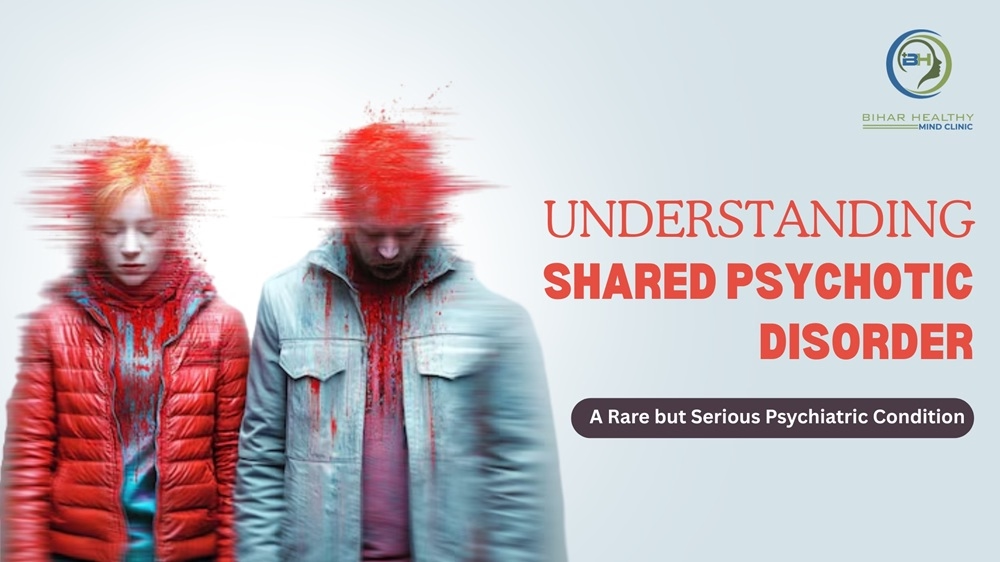
Shared Psychotic Disorder, also known as folie à deux, is an uncommon yet intriguing psychiatric condition in which delusional beliefs are transferred from one person to another. This disorder typically occurs between individuals who are emotionally close, such as couples, siblings, or family members. While rare, the condition requires serious clinical attention and an experienced approach to treatment.
At Patna Psychiatry, under the guidance of Dr. Saurabh Kumar, MD (Psychiatry), patients experiencing this rare disorder receive empathetic and evidence-based psychiatric care. Dr. Saurabh Kumar is known for his clinical expertise and compassionate care in addressing challenging psychiatric conditions such as shared psychotic disorder.
What Is Shared Psychotic Disorder?
Shared psychotic disorder involves the transmission of a delusional belief from a primary individual (often the dominant partner) to a secondary person, usually someone submissive or dependent. This delusion can be grandiose, paranoid, or bizarre and is not grounded in reality.
The key component that differentiates shared psychotic disorder from other mental illnesses is the dependency of the secondary person on the dominant individual's delusion. Once the individuals are separated and provided with appropriate psychiatric care, the secondary person often recovers quickly.
Who Is at Risk?
The likelihood of developing this condition increases under certain circumstances, such as:
- Two individuals live in social isolation.
- One partner already suffers from a chronic delusional disorder or schizophrenia.
- The other individual is emotionally vulnerable, submissive, or dependent.
- The individuals involved often share a deep, long-term emotional bond.
Although it can affect anyone, it is more commonly seen in families, elderly couples, or siblings living together for long periods without external social contact.
Symptoms of Shared Psychotic Disorder
Early signs of shared psychotic disorder can often go unnoticed due to their subtle nature. However, over time, the affected individual starts sharing the same delusional system as the primary person.
Common symptoms include:
- Adoption of the same delusions or irrational beliefs.
- Withdrawal from social interactions.
- Resistance to opposing viewpoints or logic.
- Unusual or paranoid behavior.
- Denial of factual reality, even with evidence.
Due to the rare and misunderstood nature of the disorder, early recognition and diagnosis are crucial for effective intervention.
Diagnosis and Assessment
Diagnosing shared psychotic disorder requires a careful psychiatric evaluation. Mental health professionals often look for:
- A clear history of delusional belief sharing.
- Close emotional relationships between the individuals involved.
- Improvement of the secondary person after separation.
- Absence of primary delusional disorder in the secondary person post-intervention.
At Patna Psychiatry, thorough assessments using psychometric tools and clinical interviews are carried out by experienced mental health specialists to ensure accurate diagnosis.
Treatment Options at Patna Psychiatry
Effective treatment of shared psychotic disorder often depends on a well-rounded approach that may involve:
- Separation of Individuals - One of the first steps is physically and emotionally separating the individual who has adopted the delusion from the dominant person. This alone can often lead to a substantial improvement.
- Psychotherapy - Cognitive Behavioral Therapy>(CBT) helps the affected individual recognize irrational thoughts and gradually rebuild independent thinking. This therapy is especially effective in mild to moderate cases.
- Medication - Antipsychotic drugs are typically given to the individual with the primary delusion and, when needed, to the secondary person as well. These medications help manage delusional thinking and associated symptoms.
- Family Therapy - In cases where family members are involved, group or family therapy is encouraged to restore healthy communication patterns and prevent relapse.
With a patient-centric model of care, Dr. Saurabh Kumar and his team focus on long-term recovery, helping individuals regain control over their thoughts and life.
Why Choose Patna Psychiatry?
Choosing the right mental health clinic is crucial for the successful treatment of rare psychiatric disorders like shared psychotic disorder. At Patna Psychiatry, patients receive:
- Comprehensive diagnosis and tailored treatment plans.
- Confidential and empathetic care.
- Evidence-based interventions from a team led by the Best Psychiatrist in Patna, Dr. Saurabh Kumar.
- Safe, therapeutic environment for recovery.
Final Thoughts
Despite being uncommon, shared psychotic disorder is a critical mental health issue that requires prompt and appropriate treatment. Through skilled diagnosis and compassionate care, recovery is absolutely possible. If you or someone you know is showing signs of this condition, don't hesitate to reach out to a professional.
Patna Psychiatry remains committed to providing the highest standards of mental healthcare for complex psychiatric conditions. Schedule an appointment with Dr. Saurabh Kumar to begin your journey toward improved mental well-being.
Visitors: 179





No comments yet.